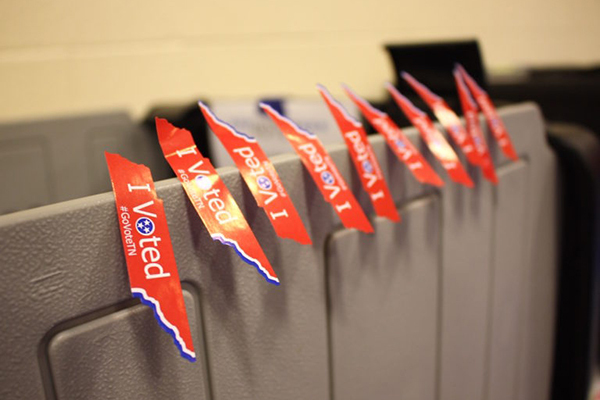
During the last few months, Tennessee has been hit with a flurry of legal challenges over its election laws amid a pandemic.
The lawsuits have gone mostly after the state’s requirements to apply and receive an absentee ballot.
This has caused some confusion during the final stretch of the November presidential election.
So, to clarify any doubts, WPLN News has a breakdown of the status of the lawsuits and the rulings:
Absentee Ballot Request Form Has To Include COVID-19 Language
Earlier this year, the Tennessee Supreme Court sided with the state and overturned universal absentee voting in the state.
It also kept Tennessee’s position that fear of contracting COVID-19 is not a qualifying reason for mail-in voting.
But, a lower court this month instructed the state to include language in the request form that makes it clear that those with underlying conditions, or taking care or living with someone with one, could qualify for an absentee ballot.
For those Tennesseans concluding they need an absentee ballot but worried about getting in trouble, the state has said it will not pursue perjury charges against them.
According to the Associated Press, the state said that if a person believes they qualify, the state could not prosecute because it “could not prove the elements of the crime.”
Who Gets To Distribute Absentee Ballot Requests?
The short answer is: election officials. Only election officials.
That’s according to a law that has been in the books for decades. This year, though, two voting rights groups challenged the law.
They claimed that criminally prohibiting the distribution of absentee ballot applications “is an extraordinarily burdensome constraint on their ability to fully engage with voters and to encourage them to vote this fall.”
They also argued that it violates their First Amendment Right.
But, Judge Richardson also sided with the state on this one, keeping the law intact. He said the law doesn’t restrict political speech and that it doesn’t restrict “First Amendment ‘speech’ at all.”
“If some Tennesseans think that the Law is too broad, or enforced too harshly, or out of step with the Internet era, they should seek to persuade their legislators to amend or repeal the Law,” Richardson wrote in his ruling. “But the Court does not sit as a super-legislature, deciding whether it likes the law and then determining whether to enjoin enforcement of the law accordingly.”
Mail Voting Signature Law
In order for an absentee ballot to count, the state needs to verify that the signature on the absentee ballot request and on the absentee ballot match. If they don’t, the ballot could be rejected.
Voting rights groups sued the state, arguing that the signature verification provision could end up denying a voter’s right to vote. “Every absentee voter is at risk of having their ballot arbitrarily rejected based on a benign signature,” the lawsuit read.
But, Federal Judge Eli Richardson recently ruled that the provision can stay in place.
“Although the signature-verification requirement does represent some kind of obstacle between placing a vote and having it counted, the mere existence of such an obstacle does not mean that plaintiffs are excluded from voting,” Richardson said in the ruling.
He cited Tennessee’s low rejection rate (.03 percent) over the last two elections as part of his decision making.
First Time Absentee Voters Won’t Need To Show ID In Person
But, Richardson sided with the groups in one provision — the one that required first time absentee voters to show identification at an election office before casting the ballot by mail.
The state had argued that they had that rule as part of a federal law. They said it “reflects ‘the intent of Congress that voters who register by mail show identification.'”
But, Richardson disagreed.
He said most of state’s asserted interests “are illusory, as they are premised upon a non-existent congressional requirement and non-existence congressional intent, respectively.”
Richardson said his decision would have favorably impact the public because “it would serve to prevent what, based on the current record,
likely would be a violation of the First Amendment right to vote enjoyed by the American citizenry.”
This means that now, first time mail voters won’t have to show up in person. Instead, they will be required to submit a copy of their identification when mailing their absentee ballot.
Clarification: This story was updated on Oct. 6 to explain that a voter’s signature on the absentee ballot application will be compared to the signature on the ballot.

